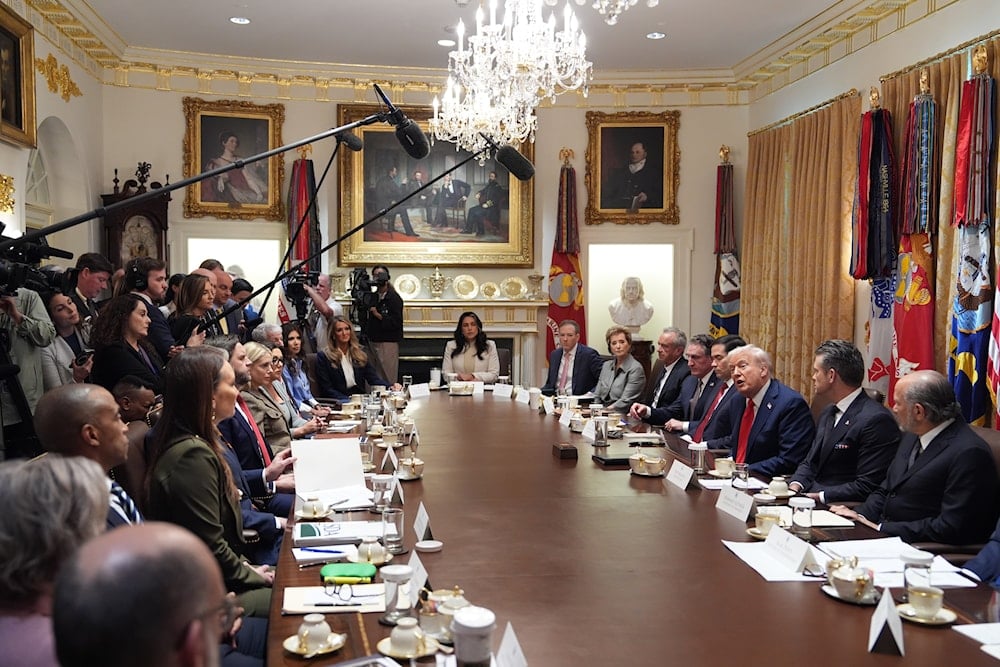Trump faces growing judicial resistance across the US
Federal judges across the US are increasingly challenging the Trump administration's legal actions, raising concerns over DOJ credibility, National Guard deployments, and vindictive prosecutions.
-

US President Donald Trump speaks during a cabinet meeting at the White House on October 9, 2025, in Washington. (AP Photo/Evan Vucci)
Federal judges across the United States are increasingly confronting the Trump administration over its legal actions, deployments, and courtroom strategies, deepening what observers see as a growing judicial conflict with the executive branch.
A report by The Washington Post (WP) on Friday stated that in Oregon, a judge appointed by US Donald Trump himself ruled that the administration’s deployment of the National Guard to Portland was "simply untethered to the facts." In Chicago, Judge April M. Perry, a Biden appointee, cited a "lack of credibility" in affidavits from the Department of Homeland Security and partially blocked troop deployments to the city.
The rulings follow a pattern of legal resistance from the judiciary to the administration’s aggressive use of executive power, according to WP. In Tennessee, an Obama-appointed judge ruled that a Salvadoran man accused of human trafficking had presented enough evidence to pursue a rare vindictive prosecution claim.
These rulings reflect a rising concern among judges that government lawyers are failing to uphold the truth in court and are, at times, offering misleading or incomplete legal justifications.
In a high-profile case, US District Judge Waverly Crenshaw ordered an evidentiary hearing into the prosecution of Kilmar Abrego García. Crenshaw wrote there is "some evidence" suggesting the case could be retaliatory, noting public comments from senior officials that may have compromised the prosecution’s integrity.
Similar concerns were raised earlier in the administration when a DC judge criticized government attorneys for being "unable to fill in basic details" in a sanctions case. In Virginia, a judge dismissed weak evidence in an immigration case, calling it "very shoddy work."
DOJ credibility eroding in federal courtrooms
Legal experts warn that the Justice Department’s credibility, once a cornerstone of federal prosecution, has been severely damaged. "What is happening now, over and over again, they are making arguments that the courts are finding untruthful," said former federal prosecutor Patrick J. Cotter. "They are destroying this bank account of credibility and trust that generations of DOJ attorneys have earned."
Professor Jessica Roth of Cardozo School of Law echoed the sentiment: "That reservoir [of goodwill] is being depleted. The result may be a more general unwillingness to accept prosecutors at face value."
According to the WP report, the administration’s response to judicial rulings has become increasingly combative. In reaction to the Portland ruling, Trump’s top domestic policy aide Stephen Miller accused Judge Karin Immergut of a "legal insurrection" and called the protests an "organized terrorist attack." Trump himself misidentified Immergut's gender and said, "That judge, he ought to be ashamed of himself."
Moreover, Attorney General Pam Bondi has denied any defiance of court orders, but her department has fired scores of career prosecutors, replacing them with politically appointed lawyers, many of whom have little or no prosecutorial experience. These officials are now handling some of the administration’s most controversial legal cases.
Supreme Court remains key battleground
Despite losing more than 90 lower court rulings, the administration has seen success at the Supreme Court, which it continues to rely on to uphold its most consequential policies. A Justice Department spokesperson emphasized that "President Trump’s policies have been consistently upheld as lawful by the Supreme Court." Still, the heavy dependence on the high court does not erase the growing concern over how the administration engages with lower courts, the report suggested.
The administration’s public commentary on active cases, typically avoided by past White Houses, has further undermined traditional DOJ norms and raised ethical questions. Federal guidelines advise against such comments to protect the reputations of defendants and ensure impartial trials.
With tensions escalating and courtroom credibility eroding, legal experts warn of long-lasting damage to how the Justice Department is perceived by judges. As Cotter put it: "Once that credibility is gone, it’s very difficult to earn it back."

 4 Min Read
4 Min Read










